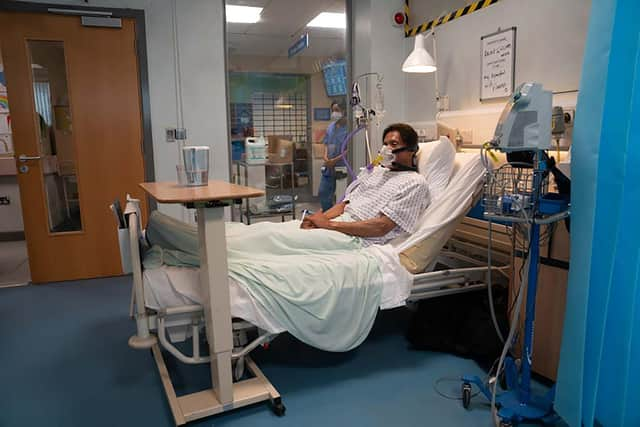Breathtaking ITV: Team behind ITV drama look back at lockdown four years on
Covid-19 left an indelible mark on everyone. But inside hospitals on the front line of the pandemic, there was chaos, confusion and abject fear.
While governments assured citizens that everything was under control, oxygen ran out, doctors floundered to treat an illness they did not understand and hundreds of thousands of people died.
Advertisement
Hide AdAdvertisement
Hide AdITV’s Breathtaking is a searing portrayal of the early days of Covid-19 through the lens of an NHS doctor.


Anchored by the blistering memoir of doctor Rachel Clarke, it was adapted for the screen by Clarke and scriptwriters Jed Mercurio and Prasanna Puwanarajah, themselves both former doctors.
“Viewers are going to come to this drama believing they understand the basics of the story because we all lived through the pandemic, we’ve all got our own experience,” says Clarke, 52.
“But they are going to discover that they’re not an observer reading about statistics as they appear in the newspapers, very detached from the unfolding reality. They’re going to find themselves planted, smack bang in the middle of the real-time pandemic as it affected us, the frontline staff.
Advertisement
Hide AdAdvertisement
Hide Ad“And they are going to find themselves feeling what we felt. Our fear, our exhaustion, the claustrophobia, the discomfort of the PPE, the horror of what was happening to patients.


“All of a sudden, they’re going to find themselves plunged into that, and through feeling that story, what it was actually like for NHS frontline staff. And I hope that is going to be not just revelatory, I hope it’s going to stop people in their tracks.”
That was the visceral experience for Downton Abbey’s Joanne Froggatt, who helms the drama as Dr Abbey Henderson, a frontline hospital consultant.
Reading the script, Froggatt was shocked and devastated.
“Very soon into the first script I started shedding a tear or two and that’s never happened to me before in 27 years of reading scripts,” she says.


Advertisement
Hide AdAdvertisement
Hide Ad“I was blown away and just thought people needed to know what was really happening, not just what we were being told. These people’s stories need to be out there. We need to be aware of what these people have done for our community.”
Clarke hopes that bringing those stories into living rooms will enable people to connect with “what was completely barricaded behind the closed doors of the hospitals”.
“They’re going to appreciate what staff went through, what they tried to do, how hard it was, how desperately important it was, and actually, how important it is that we don’t consign this to history, we remember it and we bear witness to what happened – partly because we owe NHS staff that but also because we need to learn from this. There will be another pandemic and we need to do better next time.”
Mercurio, who is is best known for crime thrillers Line Of Duty and Bodyguard and medica drama Bodies, read the book Breathtaking in one sitting.
Advertisement
Hide AdAdvertisement
Hide Ad“I just thought, this is an authentic account from the front line, and it felt like a story we had to tell.”
“That mismatch between the public messaging and the professional reality is the centrepiece of the drama,” Mercurio, 58, continues. “And if the messaging to the public had been transparent, then people within the NHS would have felt more supported and heard.”
Everything that happens in Breathtaking is based on the real experiences of staff and patients. Nothing is invented or exaggerated.
The bar the team set for themselves was that any medical professional watching would think, “Good God, this is the NHS as it truly is. This is not Grey’s Anatomy. This is not ER. This is the work. This is my job that I’m seeing on screen”, says Clarke.
Advertisement
Hide AdAdvertisement
Hide AdThe filming technique deployed by director Craig Viveiros tracked the same contours – a 360-degree set with real-time, long takes and hand-held cameras to evoke how it would have really felt.
“It was a really immersive experience,” says Froggatt, 43. “The first week, I remember all the actors were looking at each other going, ‘God this feels so real’. It was surreal. And you want to get to that headspace as an actor – where you’re so focused that you lose yourself and you’re in this separate little world.”
For everyone involved, it was a step back into the past.
“It certainly brought it back for all of us,” remarks Froggatt. But for most people who have watched it, she says it has actually been a “cathartic” experience.
“They didn’t realise how much they’d bottled up from that time. Somebody who hadn’t lost anyone or had any major trauma, but still was so affected by it, said to me, ‘I didn’t realise how much I was holding on to’. Like Rachel always says, whether it was a small loss or a big loss, we were all affected in some way.”
Advertisement
Hide AdAdvertisement
Hide Ad“We all lost something,” Clarke agrees, “even if we just lost our peace of mind. We were all scared. And it’s crazy not to think about it, isn’t it?”
“One of the most important things for me was countering the misinformation about the pandemic and how the NHS coped,” says Clarke on her impetus for making the series.
“As we’ve seen so incredibly with Mr Bates, a well-told story on television has the power to transform not just the public conversation but actually achieve tangible ends such as justice finally for all the postmasters and postmistresses.
“One of the problems with the temptation of consigning a traumatic experience to our personal and collective histories is the fact that it creates a space in which people can push alternative narratives. There’s a lot of historical revisionism going on now with Covid.”
Advertisement
Hide AdAdvertisement
Hide AdShe mentions prevalent ‘scam-demic’ conspiracy theories about empty hospitals, Bill Gates microchips, the anti-vax movement, the large numbers of people that believe Covid did not really happen or that nobody died.
“All of that matters because 230,000 people died in Britain of Covid … The NHS was overwhelmed. Care was rationed. There were not enough ventilators. People died who shouldn’t (have). These are facts.
“And we need to remind the public of the facts because if we don’t, we are emboldening people who spread disinformation that potentially ends up costing lives.
“For me, the imperative is all about candour. And it’s about not inching away from trauma. It’s about looking at it and saying this happened and this was hellish. And we need to a) confront this, and b) learn from it and figure out in as open a way as we possibly can how to do things differently and better next time.”
Breathtaking is available to watch on ITVX.
Comment Guidelines
National World encourages reader discussion on our stories. User feedback, insights and back-and-forth exchanges add a rich layer of context to reporting. Please review our Community Guidelines before commenting.